Darkley: A singing congregation silenced by gunfire
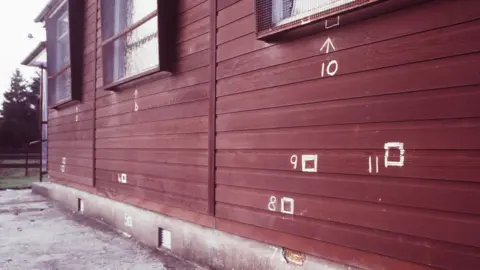 Pacemaker
PacemakerIt was one of the most horrifying pieces of audio I ever put to air in my entire 40-year career in broadcast journalism.
The sound of a congregation singing, only to be interrupted by the sound of gunfire as gunmen burst into their small, rural gospel hall in Darkley, south Armagh, on a cold November night 40 years ago.
The Mountain Lodge Pentecostal church was a relatively small congregation of fewer than 100 people, a Protestant community in a mainly Catholic area, not far from the Irish border.
It was probably their religion and location which marked them out as an easy target that night, 20 November 1983, for a group calling itself the Catholic Reaction Force - a cover name for the Irish National Liberation Army (INLA).
I had been despatched to the scene from the Downtown Radio newsroom in Newtownards, County Down, where I worked at the time.
There were reports of a shooting incident near Keady in County Armagh and after check calls were made it quickly became clear that this was a major incident.
'I saw the carnage'
By the time I arrived at the scene, the wooden hall was cordoned off by armed police and the Army.
Unusually for that time, I was brought inside the hall by a Royal Ulster Constabulary (RUC) press liaison officer along with another news reporter, to see the carnage for myself.
Three of the church elders who had been welcoming people to their evening service had been shot in the entrance porch before at least three gunmen opened fire on the rest of the congregation of about 70 men, women and children.
The dead and injured had already been taken from the scene.
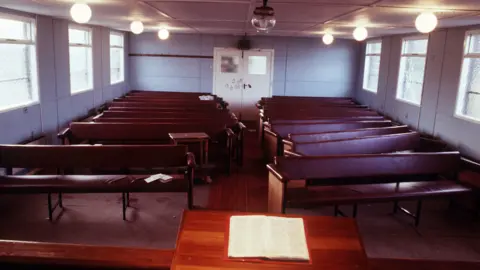 Pacemaker
PacemakerI stepped around the bloodstains in the hallway and walked past the bullet-riddled double doors into the room where the worshippers had been singing "Are you washed in the blood?" - composed by an Ohio Presbyterian minister and first published in Songs for Gospel Meetings and Sunday Schools.
Who would have thought that a century later those singing that Pennsylvania-inspired hymn would be part of the soundtrack to one of the most shocking atrocities of the Troubles in Northern Ireland?
I had taken time to observe and digest what I was seeing in front of me in the hall.
Bullet holes were clearly obvious on the wooden walls and the padded benches. Lots of bullet holes.
Blood stained the seats and floor, and had splattered onto hymn books which lay scattered about.
'Their aim was to kill'
I tried to imagine people, men, women and children, families, standing here just a few hours earlier worshipping at the weekly Sunday night service.
And then the masked men came with their automatic weapons, opening fire without warning on the elders.
Two were killed almost immediately.
The third, fatally wounded, staggered into the main hall to warn the others.
He was followed in by the armed attackers who opened fire indiscriminately.
Their aim, to kill whoever was in that room.
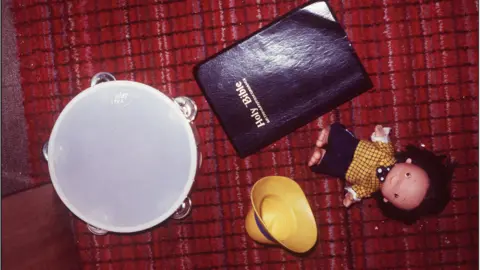 Pacemaker
PacemakerThe pastor, Bob Bain, stood up in the middle of the carnage and cried out: "In God's name stop."
It did momentarily, as one of the guns jammed, but it started again as the killers fled, spraying the outside walls of the hall with more bullets.
They drove off leaving three men dead - Victor Cunningham, David Wilson and Harold Browne - and seven others wounded.
I interviewed a senior RUC officer at the scene, then drove back to my newsroom to prepare a report for the midnight radio news and get a package ready to broadcast on the breakfast news bulletins.
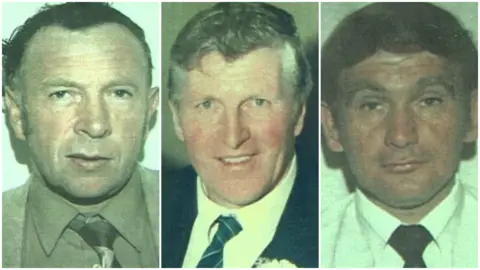
My concern was trying to find the right words to convey the horror of what had happened in Darkley.
While I was doing this, I got a call from the same press liaison officer I had met at the scene.
He told me he had something which he thought I would be interested in.
I asked him what it was.
He told me that a member of the congregation had been recording the service on a cassette tape recorder and it included the moment when the gunmen struck.
In those days, the technology did not exist to text or email me the file of the recording, so I asked him to play it to me over the mouth piece of the phone.
When I heard it for the first time it sent a chill through me, but I realised from a reporter's point of view this was the way to tell this story properly.
I was able to take a rough recording off the phone at my end which would suffice as holding audio for the next bulletin and I jumped into my car and drove to Armagh.
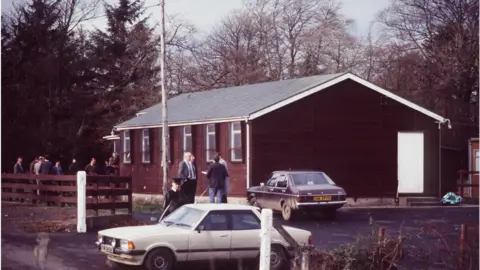 Pacemaker
PacemakerAbout one o'clock in the morning in Gough Road RUC barracks, I was able to do a tape transfer of the recording using a hastily lashed together piece of equipment thanks to our radio station's chief engineer.
The following morning those 47 seconds of audio - death and horror descending on unsuspecting worshippers - was broadcast on radio news bulletins in Northern Ireland, across the UK and eventually the world.
There had already been and would continue to be incidents involving much higher levels of dead and injured in the Northern Ireland Troubles.
However, Darkley resonated and struck fear into many people's hearts because of the nature of the attack.
Eleven months earlier in January 1983, a judge, William Doyle, had been shot dead after attending Sunday Mass at a Catholic church in south Belfast.
A community in fear
But Darkley was the first time during the conflict that people had been attacked inside their place of worship.
Furthermore, the congregation had no connection with the security forces.
They were shot because they were Protestants.
The killers claimed it was in retaliation for loyalist paramilitary murders of Catholics over the preceding two years.
People, not least those in authority, wondered what would be next.
Would there be retaliation for Darkley and if so who would be targeted?
Fear descended on communities who may have already felt at risk on both sides of the sectarian divide.
'Shock, grief and anger'
There was a feeling that the violence had reached a new level of madness.
The morning after the attack, Prime Minister Margaret Thatcher sat at her desk in Downing Street and wrote a letter to Pastor Bain at Darkley.
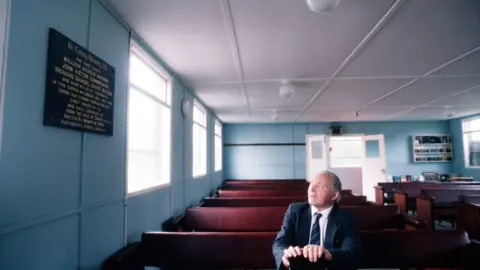 Pacemaker
Pacemaker"I had to write to you straightaway to send you personally my deepest sympathies on last night's horrific outrage," she said.
"I can imagine the sense of shock, grief and anger that must be in all your hearts today.
"I fully share these feelings. It was a despicable and disgusting act perpetrated by people without humanity and without conscience.
"We shall do everything in our power to bring them to justice."
The prime minister was clearly moved by what had happened in Darkley and perhaps that came about because of her own austere Methodist upbringing and lifelong Christian faith.
However, she may have misjudged the Darkley congregation in one respect.
Anger was not something usually expressed by those who spoke about what had happened.
Memorial to the three men
In the immediate aftermath, there were calls from the church's pastor and others for no retaliation.
While the families of the dead grieved, the injured and their relatives praised the power of prayer for their recovery.
Over the years the congregation has grown and today inside the rebuilt and much larger Mountain Lodge Pentecostal Church, a memorial to the three men murdered reads: "Who shall separate us from the love of Christ."
To put the atrocity in some kind of context, Darkley was a cold-blooded sectarian attack on a hall full of worshippers whose only defence was their faith.
